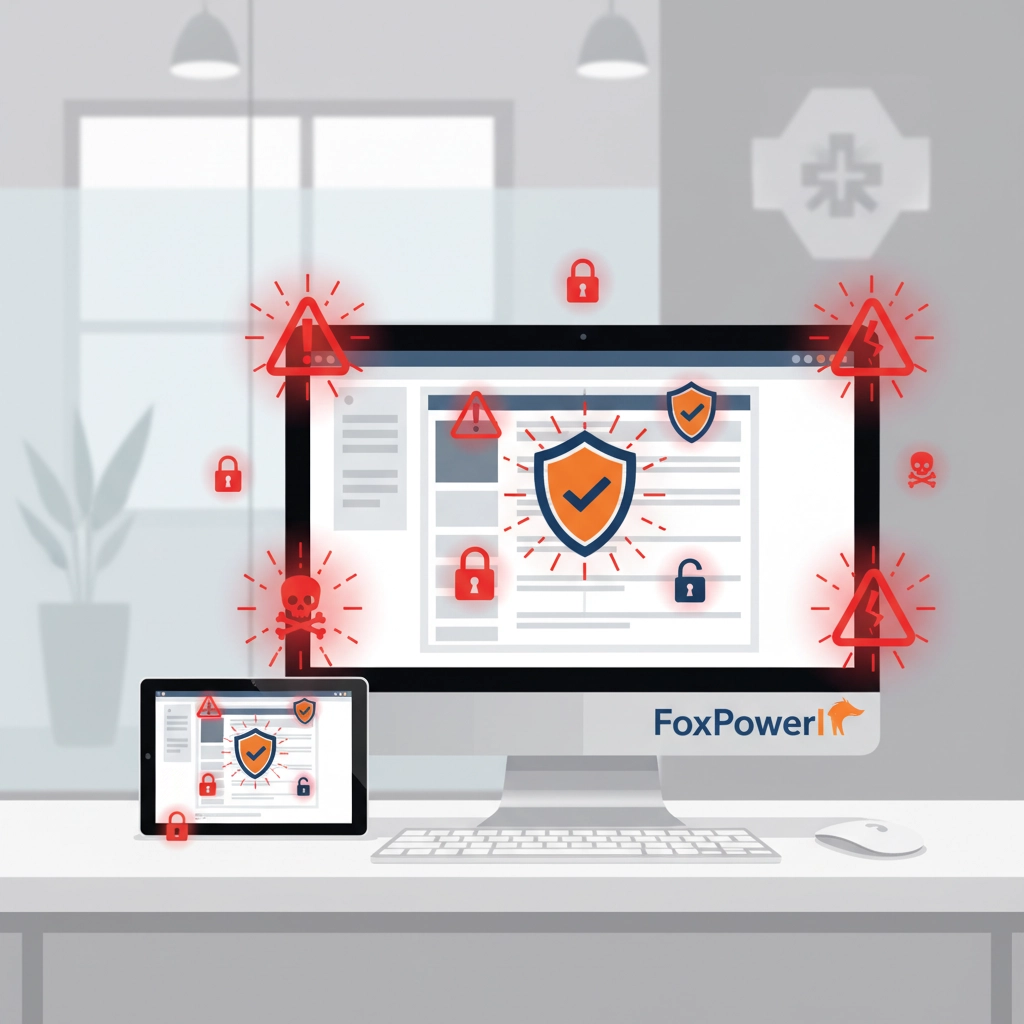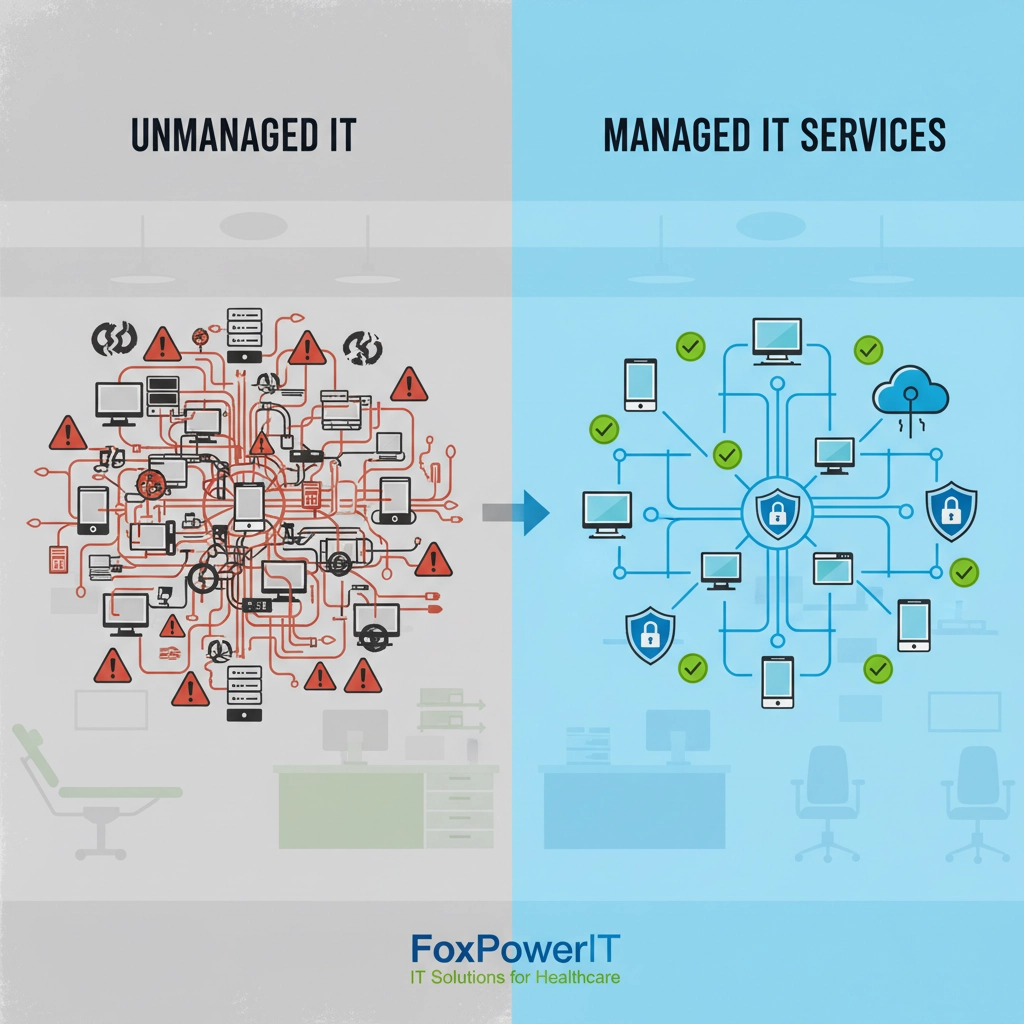You're running a successful dental practice in Hartford. Your appointment book is full, patients love your team, and you're finally seeing the profits you worked so hard for during those long years in dental school. Then one morning, you get a call that makes your stomach drop: "Doctor, I think we might have a HIPAA problem."
Maybe it's a laptop left in a car overnight. Maybe it's an email sent to the wrong patient. Or maybe it's something you never even thought about, like your cloud backup service not having the right encryption protocols. Suddenly, you're facing potential fines, angry patients, and sleepless nights wondering what other compliance gaps might be lurking in your practice.
If this scenario sounds familiar, you're not alone. Connecticut medical and dental practices are navigating an increasingly complex web of privacy regulations that goes far beyond basic HIPAA requirements. The state has positioned itself as a privacy protection leader, creating additional compliance layers that many healthcare providers aren't even aware of.
Here's the thing that most practice owners don't realize: Connecticut's privacy laws don't just add extra paperwork, they can actually override federal HIPAA requirements in some cases, creating a dual-layer compliance nightmare that's almost impossible to manage without the right IT infrastructure and support.
Connecticut's Privacy Landscape Is More Complex Than You Think

When most healthcare providers think about compliance, they focus on federal HIPAA requirements. Makes sense, right? But Connecticut has been busy building its own privacy protection framework that creates additional obligations for medical and dental practices throughout the state.
The state's enhanced privacy protections became particularly complicated in July 2025 with new rules for reproductive and gender-affirming care. Under these enhanced protections, HIPAA business associates, think your IT vendors, billing companies, and cloud storage providers, are now subject to the same restrictions as your practice when handling reproductive health information.
What does this mean for your day-to-day operations? Well, if you're a family practice that occasionally handles reproductive health issues, or a dental practice that treats transgender patients, you now need to ensure your business associates meet Connecticut's enhanced requirements, not just standard HIPAA protocols.
Connecticut's data breach notification law also creates tighter timelines than federal HIPAA requirements. While HIPAA gives you 60 days to notify affected individuals of a breach, Connecticut's law may require faster notification depending on the circumstances. Miss these deadlines, and you're looking at state penalties on top of potential federal fines.
But here's where it gets really tricky: the Connecticut attorney general actively investigates healthcare data breaches. This isn't just about compliance paperwork, it's about avoiding investigations that can shut down your practice while you're trying to prove you followed all the rules.
The Connecticut Data Privacy Act Changes Everything (Again)
Just when healthcare providers thought they had a handle on compliance requirements, Connecticut expanded its Data Privacy Act in June 2025. The changes are significant enough that most practices need to completely reconsider their compliance approach.
The law now applies to entities that control or process the personal data of at least 35,000 consumers, down from the previous threshold of 100,000 consumers. For larger medical groups, specialty practices, or dental practices with multiple locations, this expansion could suddenly bring you under the law's requirements.
More importantly, the definition of "sensitive data" has been expanded to include disability or treatment status, genetic or biometric data, and neural data. If your practice uses any biometric systems (fingerprint scanners, facial recognition, even some advanced dental imaging), you might now be subject to additional data processing requirements.
These changes take effect on July 1, 2026, with impact assessment requirements kicking in August 1, 2026. That might seem like plenty of time, but implementing the necessary IT infrastructure and processes typically takes 12-18 months for most healthcare practices.
Your Current IT Setup Probably Isn't Enough

Let's talk about what HIPAA compliance actually requires from your IT infrastructure. Most practices think they're covered because they have passwords on their computers and maybe some antivirus software. The reality is much more complex.
HIPAA compliance requires six self-audits annually to identify deficiencies and vulnerabilities in your security practices. This isn't something you can do manually with a clipboard, you need IT systems that can generate comprehensive audit trails and security reports automatically.
Your electronic health record system needs proper access controls (who can see what information), complete audit trails (tracking every time someone accesses patient data), encryption for data at rest and in transit, and business associate agreements with your EHR vendor that meet both federal and Connecticut requirements.
But here's what most practices miss: your practice management system that handles appointment scheduling, billing, and patient communications needs the same level of security controls as your clinical systems. That appointment reminder system? If it's not properly secured, it's a compliance violation waiting to happen.
Communication systems create some of the biggest compliance risks. Email, patient portals, telehealth platforms, all of these need end-to-end encryption and access controls. Sending patient information through regular email is a HIPAA violation, even if it's just appointment confirmations.
Your backup and disaster recovery systems must maintain the same security controls as your primary systems. We've seen practices get into compliance trouble because their patient data backups were stored without proper encryption or access controls. The backup data is still protected health information, and it needs to be treated as such.
Monthly and Quarterly Compliance Tasks You Can't Forget
HIPAA compliance isn't a "set it and forget it" situation. There are specific review cycles with defined timeframes that most practices struggle to maintain without dedicated IT support.
Monthly tasks include reviewing access logs for unusual activity and conducting spot checks on staff compliance with security procedures. This sounds simple, but it requires IT systems that can generate meaningful access reports and the expertise to identify potential security issues.
Quarterly requirements include comprehensive risk assessments and updating security measures based on identified vulnerabilities. Most practices don't have the technical expertise to conduct thorough risk assessments, especially when it comes to evaluating network security, server configurations, and software vulnerabilities.
Annual requirements include reviewing and updating all policies and procedures, updating Business Associate Agreements with vendors, and providing refresher training to all staff members who have access to protected health information.
Here's the challenge: these ongoing requirements create a significant administrative burden that takes time away from patient care. But skipping them isn't an option, HIPAA compliance violations can result in fines ranging from $100 to $50,000 per incident, with maximum annual penalties of $1.5 million.
Business Associate Agreements Need an Upgrade

Connecticut's enhanced privacy requirements mean you can no longer rely on standard business associate agreements for vendors handling certain types of patient data. Enhanced agreements that specifically address Connecticut's additional requirements are now necessary for compliance.
Your IT vendors, cloud storage providers, billing companies, and other business associates must implement additional safeguards beyond standard HIPAA requirements. This dual-layer compliance requirement creates complexity that most practices aren't prepared to handle without specialized support.
The problem is that many vendors haven't updated their business associate agreements to address Connecticut's enhanced requirements. Using outdated agreements creates immediate compliance gaps that could result in violations during an audit or investigation.
For reproductive health data specifically, Connecticut now requires that business associates meet the same restrictions as covered entities. This means your IT vendor can't just have standard HIPAA protections, they need to implement Connecticut-specific safeguards for this type of information.
The Real Cost of Getting This Wrong
Most Connecticut practices hesitate to invest in robust IT security measures because of cost concerns, but the financial risk of non-compliance far outweighs the investment in proper systems.
The average data breach costs small businesses $3.86 million according to IBM's latest research. That doesn't include potential HIPAA fines, legal fees, lost patients, or the cost of practice downtime while you deal with the aftermath.
HIPAA fines have been increasing steadily. In 2023, the average HIPAA settlement was $2.2 million, with individual violations ranging from $10,000 to $50,000 per incident. For practices that experience large-scale breaches or demonstrate willful neglect, fines can reach the maximum penalty of $1.5 million annually.
But here's what really keeps practice owners awake at night: Connecticut's attorney general actively investigates healthcare data breaches. This means potential state-level penalties and investigations on top of federal HIPAA enforcement actions.
The reputational damage can be even more costly than the fines. Patients who lose trust in your practice's ability to protect their information don't just leave, they tell their friends and family. In today's social media environment, a data breach can destroy decades of reputation building in a matter of weeks.
What Proper HIPAA-Compliant IT Actually Looks Like

A truly compliant IT infrastructure for Connecticut healthcare practices includes several layers of protection that work together to meet both federal HIPAA requirements and state-specific privacy laws.
Network security starts with enterprise-grade firewalls that can monitor and control all traffic entering and leaving your practice's network. Consumer-grade routers and basic firewalls don't provide the granular control and monitoring capabilities required for HIPAA compliance.
Server infrastructure needs to include encrypted storage, regular security updates, and access controls that ensure only authorized personnel can access patient data. Cloud-based solutions can be HIPAA-compliant, but they require careful vendor selection and proper configuration.
Endpoint protection goes beyond basic antivirus software to include advanced threat detection, device encryption, and mobile device management for tablets and smartphones used in the practice. Every device that can access patient information needs to be secured and monitored.
Email security requires encrypted communication systems specifically designed for healthcare environments. Regular email providers like Gmail and Outlook, even with paid accounts, don't provide the level of encryption and access controls required for transmitting patient information.
Backup and disaster recovery systems need to maintain the same security controls as your primary systems while ensuring you can quickly restore operations after a system failure or cyberattack. Many practices discover during an emergency that their backup systems don't actually work or don't include all critical data.
Ongoing Monitoring and Maintenance Requirements
HIPAA compliance isn't a one-time setup: it requires ongoing monitoring, maintenance, and updates to address new threats and regulatory changes. This is where many practices run into trouble trying to handle compliance internally.
Security monitoring needs to happen 24/7 to identify potential threats and compliance violations before they become major problems. Most practices don't have the staff or expertise to monitor their IT systems around the clock.
Software updates and patch management become critical security tasks when you're handling protected health information. Delayed updates can create vulnerabilities that hackers exploit to access patient data, but updates also need to be tested to ensure they don't disrupt critical practice operations.
User access management requires regular reviews to ensure that staff members only have access to the patient information they need for their job functions. When employees change roles or leave the practice, their access needs to be updated or removed immediately.
Documentation requirements mean maintaining detailed records of all security measures, training activities, risk assessments, and incident responses. This documentation is crucial during HIPAA audits and Connecticut attorney general investigations.
The Strategic Advantage of Professional IT Support

Working with IT professionals who specialize in healthcare compliance provides advantages that go beyond just meeting regulatory requirements. Properly implemented IT systems can actually improve practice efficiency while ensuring compliance.
Automated compliance reporting reduces the administrative burden of conducting required self-audits and risk assessments. Instead of spending hours manually reviewing systems and generating reports, automated tools can provide real-time compliance dashboards and detailed audit trails.
Proactive threat detection and response can prevent security incidents before they become compliance violations or data breaches. Professional monitoring services can identify and address potential security issues during off-hours when your practice isn't operating.
Centralized patient data management with proper access controls and audit trails can actually make it easier for staff to access the information they need while ensuring compliance with privacy requirements. Well-designed systems enhance workflow rather than creating barriers.
Regular compliance training and updates ensure your staff stays current with changing requirements and best practices. Professional IT providers can deliver ongoing training that's specific to your practice's systems and workflows.
Vendor management and business associate agreement oversight ensures all your technology vendors meet current compliance requirements. This is particularly important given Connecticut's enhanced privacy requirements and the complex landscape of healthcare technology vendors.
Planning Your Compliance Implementation Strategy
Moving from basic IT security to full HIPAA compliance requires a strategic approach that addresses immediate vulnerabilities while building toward comprehensive compliance coverage.
Start with a professional risk assessment that identifies your current compliance gaps and prioritizes improvements based on risk level and regulatory requirements. This assessment should cover all systems that handle patient information, from clinical software to appointment scheduling systems.
Develop an implementation timeline that addresses the highest-risk items first while building toward full compliance coverage. Most practices need 12-18 months to implement comprehensive compliance measures, but critical vulnerabilities should be addressed within 30-60 days.
Staff training should begin early in the implementation process and continue on an ongoing basis. Compliance isn't just about technology: it's about ensuring everyone in your practice understands their role in protecting patient information.
Documentation and policy development needs to happen alongside technology implementation to ensure your written policies reflect your actual practices and procedures. Many practices fail audits because their policies don't match their implemented systems.
Ongoing monitoring and maintenance plans should be established before implementation is complete. Compliance is an ongoing process, not a destination, and you need systems and procedures in place to maintain compliance over time.
Making the Investment Decision
The decision to invest in professional HIPAA-compliant IT support ultimately comes down to risk management and strategic priorities for your practice.
Professional IT security measures designed for healthcare compliance often cost less than a single month's revenue for most medical and dental practices. When compared to the potential cost of a data breach or compliance violation, the investment becomes much easier to justify.
The time savings from automated compliance reporting and professional IT management can free up significant staff time that can be redirected toward patient care and practice growth activities. Many practices find that proper IT support pays for itself through improved efficiency.
The peace of mind that comes from knowing your practice meets current compliance requirements allows you to focus on what you do best: providing excellent patient care. Compliance concerns shouldn't keep practice owners awake at night or distract from clinical activities.
Connecticut's privacy landscape will continue to evolve, and professional IT support ensures your practice stays current with changing requirements without having to become a compliance expert yourself.
The intersection of federal HIPAA requirements and Connecticut's enhanced privacy laws creates a complex compliance environment that requires specialized expertise and robust IT infrastructure. For Connecticut medical and dental practices, working with IT professionals who understand both the technical requirements and the regulatory landscape isn't just recommended: it's essential for long-term success and risk management.
Proper implementation of HIPAA-compliant IT systems protects your patients, your practice, and your peace of mind while potentially improving operational efficiency and patient care delivery. The question isn't whether you can afford to invest in proper compliance measures( it's whether you can afford not to.)

